Looking for the best Teamwork alternatives that meet all your requirements is like finding a needle in a haystack these days. You can easily find project management tools and new Teamwork competitors on AppSumo or Product Hunt.
Don’t get me wrong, Teamwork is great for helping teams streamline communication and collaboration activities. Its invoicing and budgeting tools are integrated greatly with its views.
But for some users, tinkering with unintuitive permission controls and task adjustments can sometimes hinder their productivity rather than help. With this in mind, we curated a list of the best Teamwork alternatives to fill these gaps.
What is Teamwork?
Teamwork is a project management software designed to help teams align progress and processes. This cloud-based tool offers multiple views (Kanban, Table, Gantt, etc.) and features like resource management and time tracking to help deliver projects on time.
It is known for offering various functionalities, spanning data intaking (with forms) to financial oversight (via invoicing). Project managers can assign tasks, utilize templates, customize fields, and leverage automation tools to reduce manual effort.
Pros:
- Versatile selection of views (Kanban, tables, Gantt Chart, Client, My Work, etc.)
- Easy-to-use automation tools for integrated workflows.
- Offers comprehensive features for time and budget tracking.
- Provides customizable alerts to manage client engagements.
- User-friendly, ensuring a smooth learning curve.
Cons:
- Limited flexibility in permission controls.
- The pricing is set at user/year, which is not great for managing short-term teams.
- The task and milestone adjustments mechanism could be more intuitive.
- The email notification system requires fine-tuning.
- The lack of mobile apps restricts on-the-go app access.
Plans & Pricing:
- Free
- Starter ($5)
- Deliver ($9.99)
- Grow ($19.99)
- Scale (Contact Sales)
Customer Ratings:
- G2: 4.4 out of 5 (1,073 reviews)
- Capterra: 4.5 out of 5 (851 reviews)
10 Best Teamwork Alternatives in 2024
Projects often need flexible controls and permissions to make each process run smoothly and within schedule. Unfortunately, Teamwork doesn’t have these characteristics in some features. Check out the list of the most popular project management alternatives to Teamwork below.
1. Ahsuite
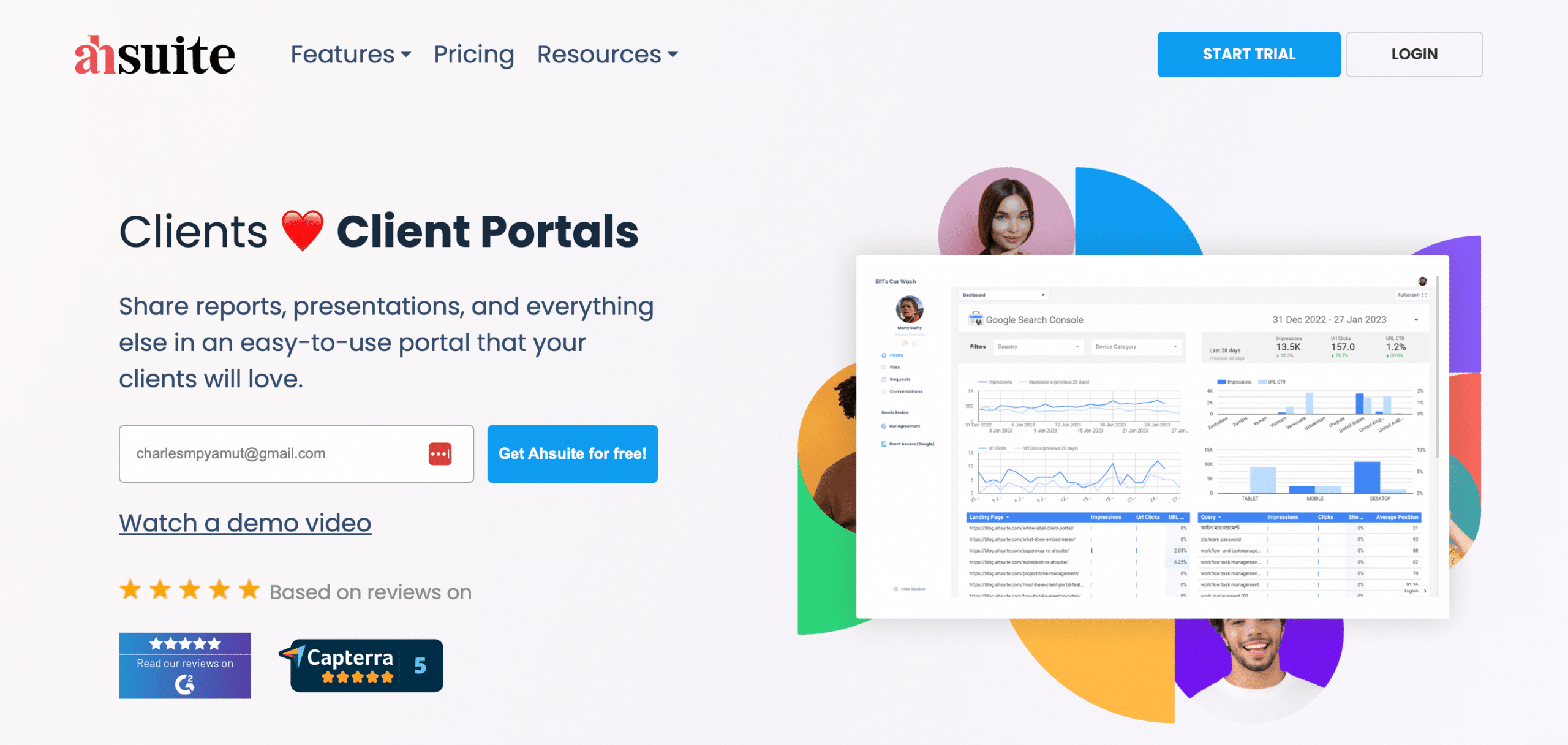
Ahsuite makes managing conversations, tasks, and files across clients and teams effortless through its minimalist design, snappy performance, and stringent security measures. This tool redefines how digital agencies collaborate, eliminating the clutter of multiple tools.
Tailored for digital agencies, Ahsuite provides improved client security through efficient single logins. Customize your workspace, share files quickly, and engage in productive discussions. Ahsuite boosts productivity by centralizing task management and team member interactions.
Pros:
- Offers easy permission control for files and users.
- Known for clean interfaces and customizable portals.
- Short learning curve, flexible, and robust.
- Provides fast and reliable customer service.
- Direct client communication via live chat and file sharing.
Cons:
- Needs better documentation.
- The client approval process could improve.
- Lacks client invoicing feature (in development).
- Limited customization with code (being addressed).
Plans & Pricing:
- Starter (Free)
- Professional ($17)
- Agency ($29)
Customer Ratings:
- G2: 4.7 out of 5 (76 reviews)
- Capterra: 5 out of 5 (19 reviews)
2. Basecamp
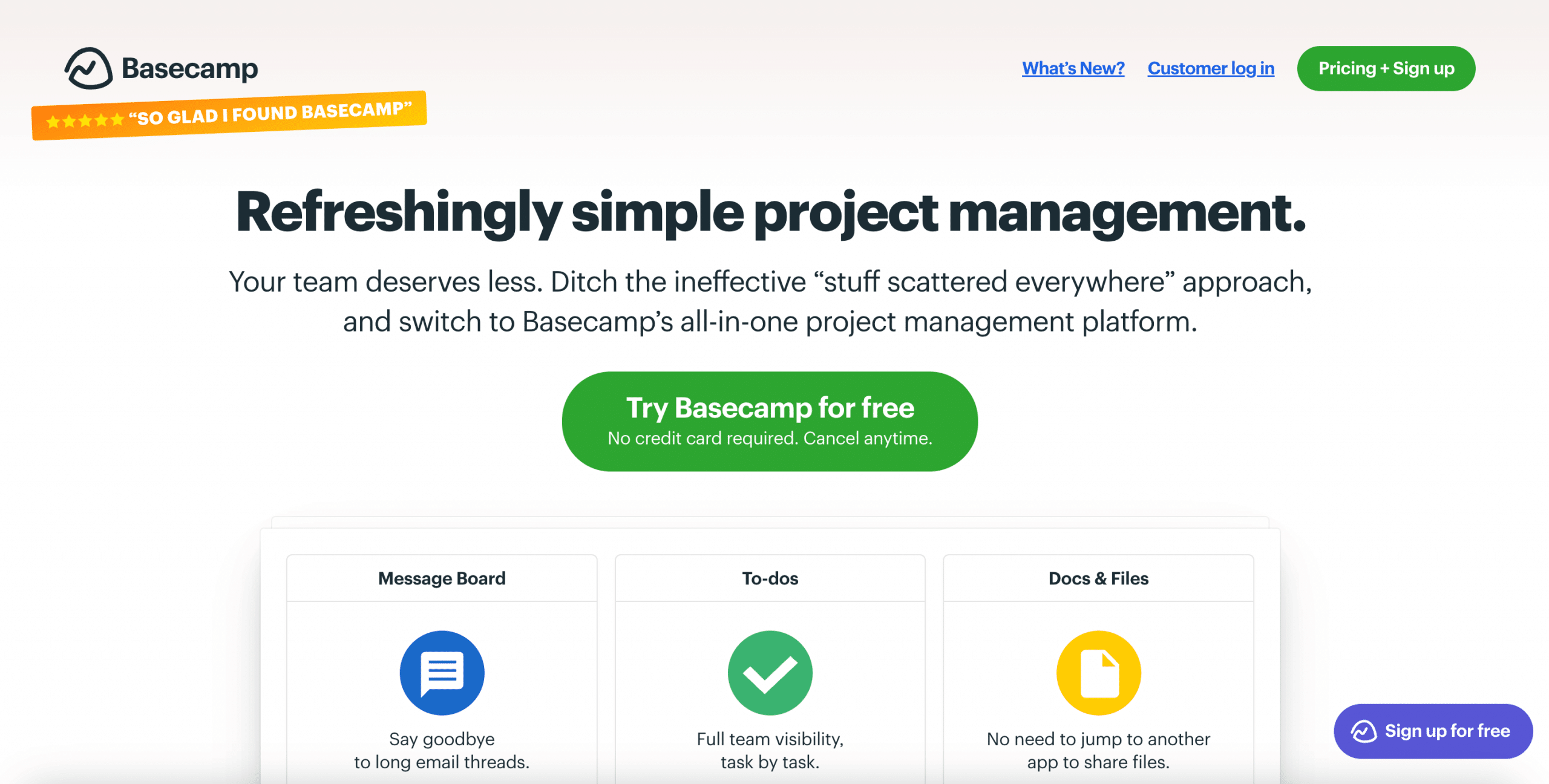
Basecamp makes workflow management and team communication hassle-free with its built-in dashboards, chats, to-dos, and file management. It offers a comprehensive suite of features for sharing and coordinating information to help teams tackle complex projects efficiently.
As a Teamwork alternative, Basecamp shines with its one-page dashboard and its flat-fee pricing structure. Users can also drive alignment across team members by using the check-in tools and the all-encompassing Kanban/Timeline view.
Pros:
- Flat-fee pricing is ideal for larger groups.
- Offers straightforward, practical software tools.
- The Mobile version is great for receiving updates on the go.
- Features work as advertised out of the box.
- Simple admin and platform navigation.
Cons:
- Flat-fee plans are costly for small to mid-sized teams.
- Less suitable for very complex projects.
- Free plan not available for platform testing.
- Customer service could be more responsive.
Plans & Pricing:
- Basecamp ($15)
- Basecamp Pro Unlimited ($299)
Customer Ratings:
- G2: 4.1 out of 5 (5,273 reviews)
- Capterra: 4.4 out of 5 (14,408 reviews)
Related: 10 Best Basecamp Alternatives
3. Wrike
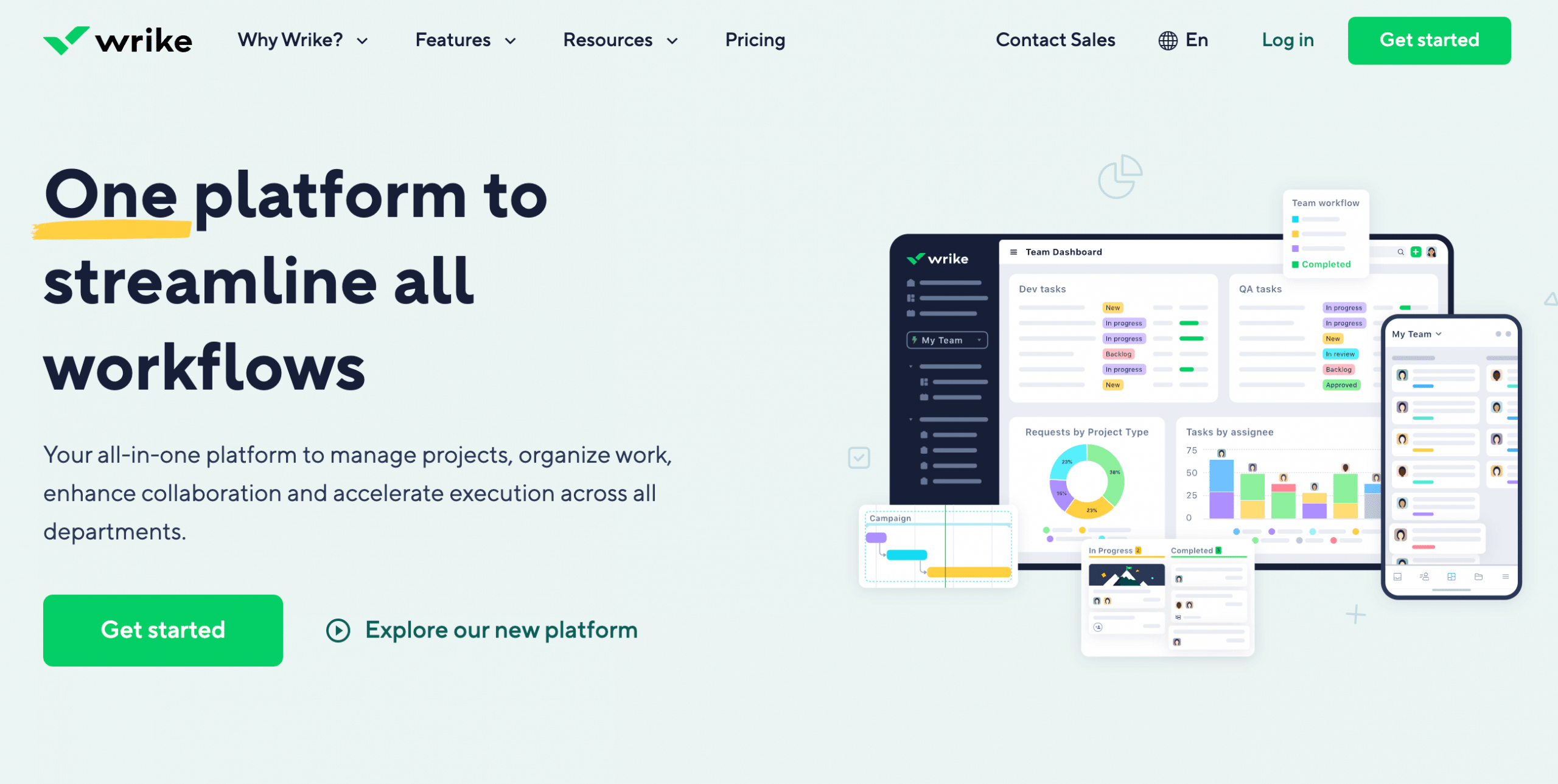
Wrike is a scalable project management software that enhances workflow visualization, collaboration, and control. This platform offers seamless app transitions for effective daily project management, boasting over 400 integrations, including Google and Microsoft Office.
In addition, it provides advanced collaboration features through Kanban, Gantt charts, and AI-based work intelligence. It has a built-in notification feature can warn users when a project is at risk of slipping.
Pros:
- Provides Kanban, Calendar, and Table views.
- Proactively alerts users for at-risk projects.
- With efforts for continuous product improvements.
- Great for resource allocation and schedule management.
- The more than 400 integrations offer versatility.
Cons:
- The Gantt chart view is limited to paid plans.
- Reporting features could be more robust.
- Performance can be slow at times.
- Dependency management may have limitations.
Plans & Pricing:
- Free
- Team ($9.80)
- Business ($24.80)
- Enterprise (Contact Sales)
- Pinnacle (Contact Sales)
Customer Ratings:
- G2: 4.2 out of 5 (3,518 reviews)
- Capterra: 4.3 out of 5 (2,584 reviews)
Related: 11 Best Wrike Alternatives
4. ClickUp

ClickUp is an all-in-one project management platform that combines various work elements like tasks, Docs, Chat, Goals, and Whiteboards to facilitate planning, organization, and collaboration. You can customize it to adapt to different team sizes and needs.
This software differentiates itself from other tools through customizable dashboards and real-time reporting. Its built-in automation system and ClickApps provide interface customization to handle diverse work requirements, from sales funnels to project management.
Pros:
- Boasts interface customization with ClickApps.
- Has an in-built automation system.
- Provides a clear task-tracking process.
- Features for assignments, dependencies, and subtasks
Cons:
- ClickUp’s Setup may require a learning curve.
- The user interface may be intimidating for non-PMs.
- The mobile app needs some desktop functionality.
Plans & Pricing:
- Free
- Unlimited ($10)
- Business ($19)
- Enterprise (Contact Sales)
Customer Ratings:
- G2: 4.7 out of 5 (9,339 reviews)
- Capterra: 4.7 out of 5 (4,009 reviews)
Related: 10 Best ClickUp Alternatives
5. ProofHub
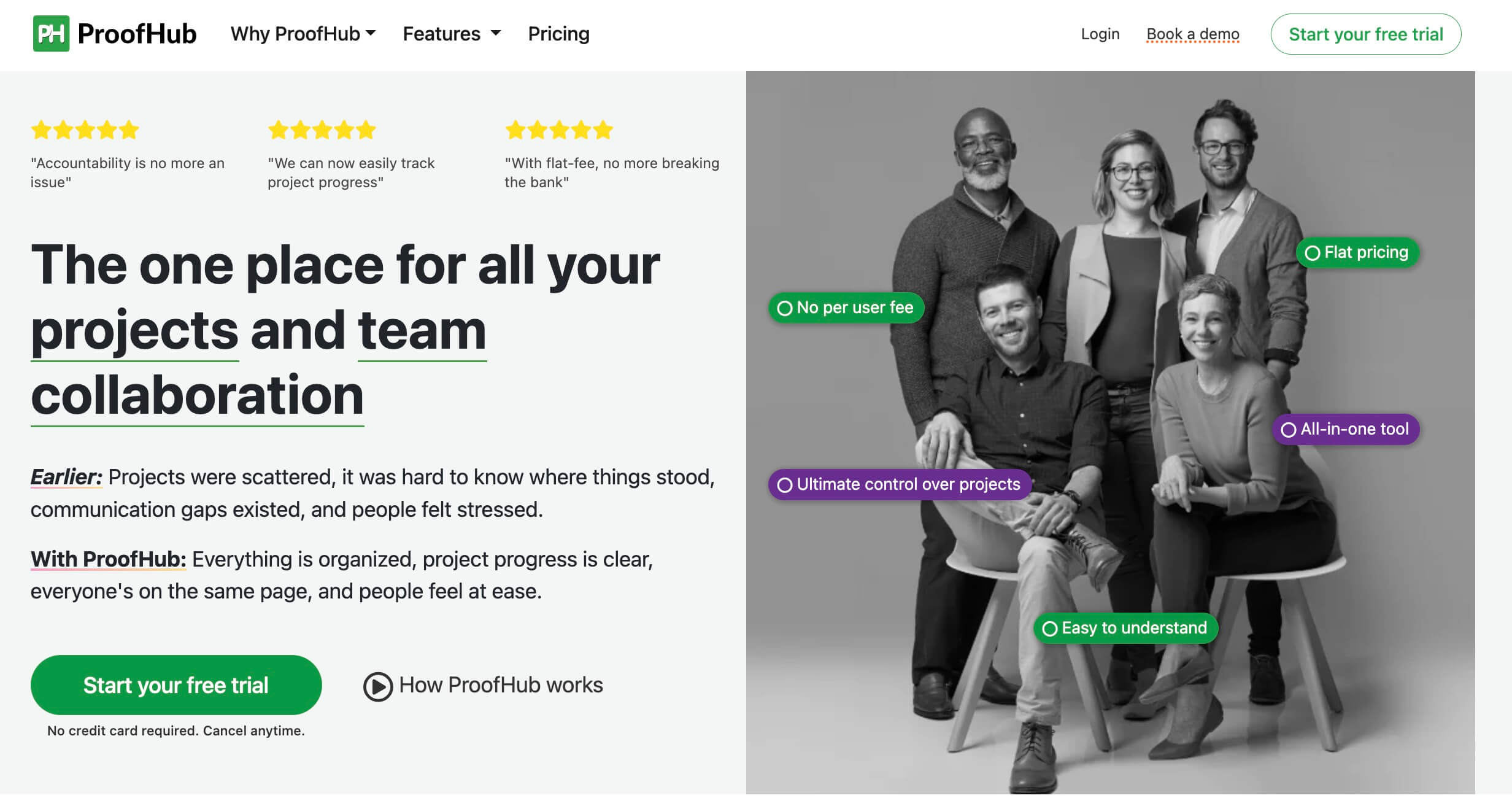
ProofHub is an all-encompassing project management tool that facilitates planning, organization, and execution. Offering a bird’s-eye view, managers can gain unparalleled insight into projects and team performance across various industries.
This client management tool offers custom roles, white labeling, and tailored workflows to fit any project’s needs. Users can track progress with detailed reports and advanced activity logs. Custom roles are also available to improve controls across the platform.
Pros:
- Simplifies complex workflows, enhancing team effectiveness.
- Features like time tracking and reporting optimize performance analysis.
- Centralizes project management for ease of access and use.
- Flat-rate pricing offers unlimited projects and users, ideal for large teams.
- Provides Gantt, Table, and Board views, among others.
Cons:
- There are reported experiences with slow loading times.
- Limited third-party integrations compared to competitors.
- Challenges in mobile app responsiveness.
- Difficulties in calendar management and support interactions.
Plans & Pricing:
- Essentials ($45)
- Ultimate Control ($89)
Customer Ratings:
- G2: 4.5 out of 5 (86 reviews)
- Capterra: 4.6 out of 5 (95 reviews)
6. Trello

Trello adapts to any team’s workflow with Kanban boards and over 100 integrations, including Google Drive and Slack. This tool makes project collaboration transparent, shareable, and enjoyable while catering to diverse work styles and industries.
Its intuitive Kanban app supports visual boards that can be fully customized to meet requirements. The platform’s strength lies in its simplicity and visual approach, making it an ideal choice for visual project management.
Pros:
- Automate workflows with ease.
- Supports multiple views and templates.
- The free plan offers core features to manage projects.
- Visual, intuitive dashboard interface.
- Quick visibility of assignments.
Cons:
- Time-tracking requires add-ons.
- Adding new team members can take time and effort.
- Suited for smaller, more straightforward projects.
- Lacks budget and invoice tracking.
- Predefined boards may feel limiting.
Plans & Pricing:
- Free
- Standard ($5)
- Premium ($10)
- Enterprise ($17.50)
Customer Ratings:
- G2: 4.4 out of 5 (13,471 reviews)
- Capterra: 4.6 out of 5 (23,089 reviews)
Related: 10 Best Trello Alternatives
7. Workzone

Workzone blends ease of use with powerful project features. Users can use features like Gantt chart, calendar views, boards, and automated to-do lists to ensure that projects are on track. Plus, the advanced reporting and resource management functions can help manage workloads.
Additionally, its integration with essential tools like QuickBooks Online, Slack, and Jira Software Cloud ensures projects stay on top of your priorities. It is a solid Teamwork alternative if you’re a project manager who appreciates the traditional approach with cloud capabilities.
Pros:
- Saves projects as personalizable templates.
- Offers Workzone API and integration options.
- Automates rules and offers cross-account views.
- Integrates with QuickBooks, Slack, and Jira.
- Facilitates workload management across brands.
Cons:
- Task editing and grouping can be challenging.
- The interface may feel outdated and less intuitive.
- Lacks batch task selection and filter function.
- Reporting can be tedious without filters.
- Hourly tracking could be more efficient.
Plans & Pricing:
- Team ($24)
- Professional ($34)
- Enterprise (Contact Sales)
Customer Ratings:
- G2: 4.2 out of 5 (53 reviews)
- Capterra: 4.8 out of 5 (201 reviews)
8. Monday.com
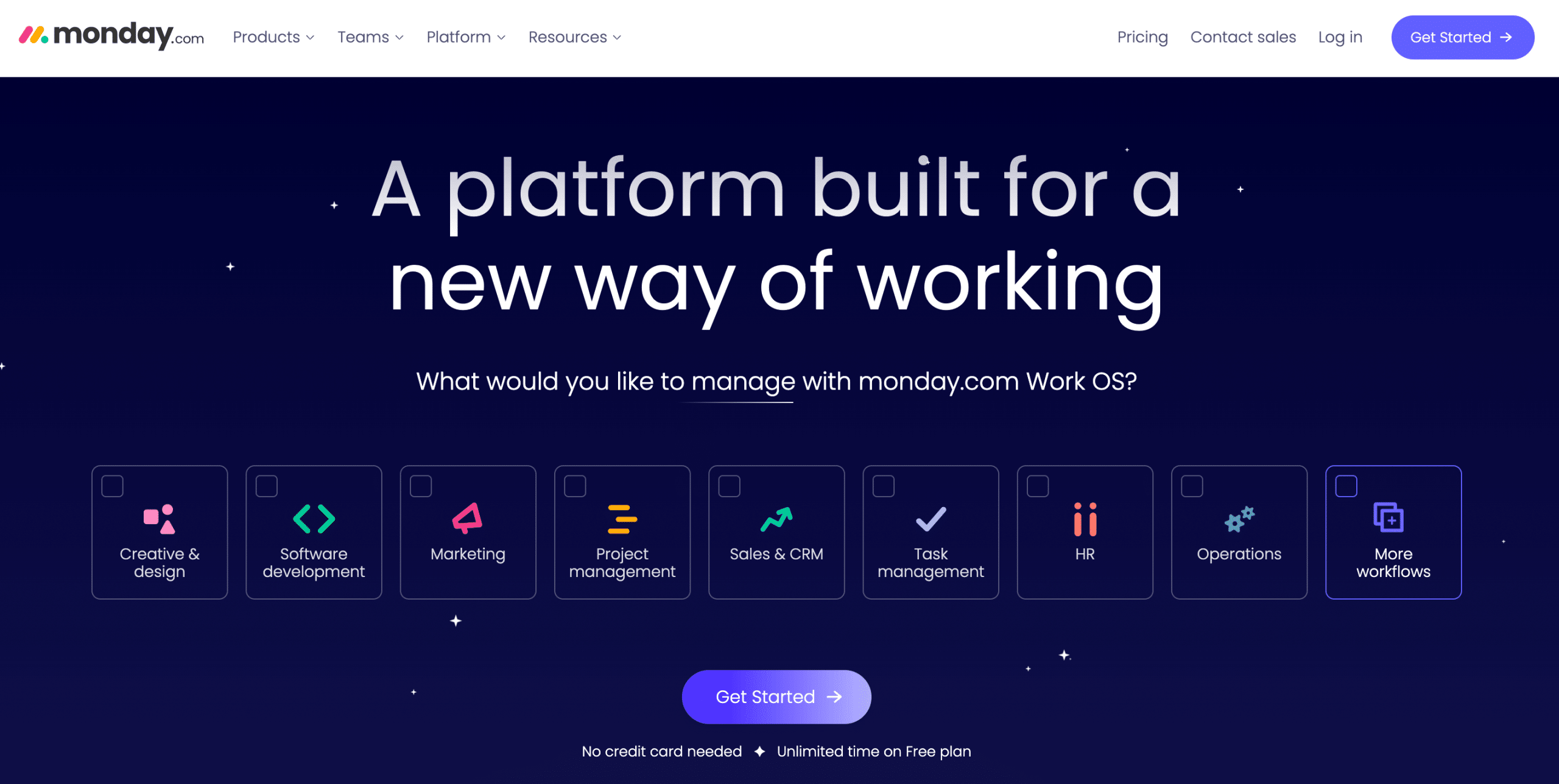
Monday.com is designed to support a wide range of PM styles using its no-code automation features and app integrations. This platform can customize many areas to keep files, processes, and people organized throughout the project lifecycle.
Users can access advanced features in its desktop and mobile versions using adaptable and user-friendly cross-platform designs. It’s ideal for small teams and large organizations, offering a versatile, real-time, in-context collaboration environment.
Pros:
- Provides responsive design and straightforward setup process.
- Known for its excellent customer support.
- Extends productivity on the go with a mobile app.
- Simplifies complex tasks into milestones for accurate planning.
Cons:
- Seat-based pricing can be too high for small l teams.
- Paid plans require a minimum of three users.
- Price increases on more features can blindside owners.
Plans & Pricing:
- Free
- Essential ($12)
- Standard ($14)
- Pro ($24)
- Enterprise (Contact Sales)
Customer Ratings:
- G2: 4.7 out of 5 (10,510 Reviews)
- Capterra: 4.6 out of 5 (4,605 Reviews)
Related: 10 Best Monday.com Alternatives
9. Smartsheet
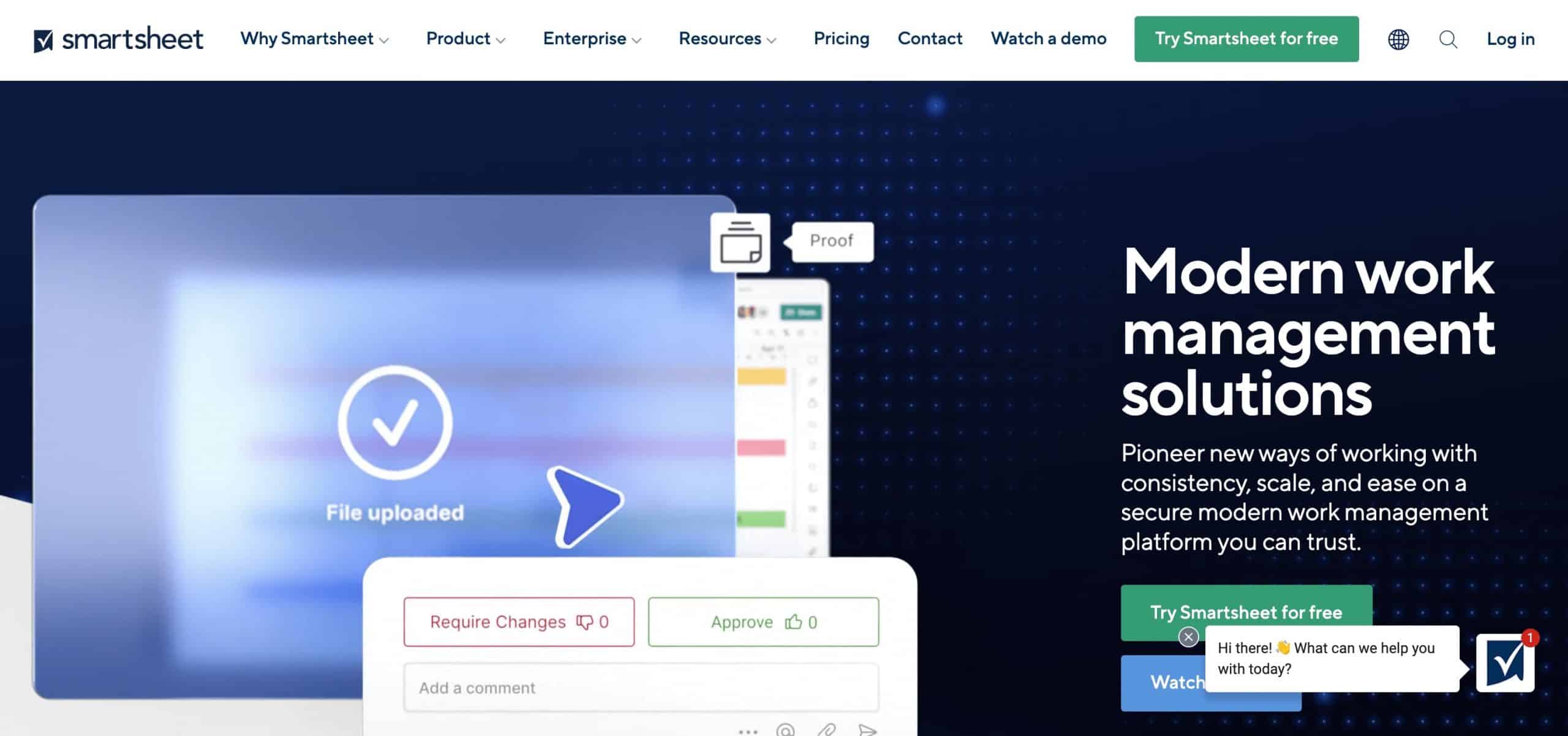
Known for its real-time visibility into project performance, Smartsheet automates project setup, enforces governance, and boosts productivity. Users can access simple tasks and complex portfolio management tools for each situation.
With Smartsheet, teams achieve unparalleled efficiency through automated workflows and collaborative workspaces. Furthermore, intelligent workflows and accessible digital asset and resource integration simplify complex processes.
Pros:
- Easy navigation for client projects.
- Streamlines project management with automation.
- Offers real-time updates and multiple views.
- Simplifies data collection and processing.
Cons:
- May encounter performance issues with large datasets.
- Higher price points could be a concern for small businesses.
- There is a steep learning curve for newcomers.
- Some features may feel less intuitive compared to Excel.
Plans & Pricing:
- Free
- Pro ($9)
- Business ($32)
- Enterprise (Contact Sales)
Customer Ratings:
- G2: 4.4 out of 5 (14,411 Reviews)
- Capterra: 4.5 out of 5 (3,153 Reviews)
Related: 10 Best Smartsheet Alternatives
10. Asana

Asana facilitates strategic plan implementation and daily task management across teams of any size. It excels in breaking down silos, transforming goals into actionable plans. Its widespread adoption across 190 countries is a testament to its effectiveness and user-centric approach.
With a feature set including project views, custom fields, and Asana Intelligence, this cloud-based project management platform supports various work management needs. It offers an integrated space for notes, updates, and messaging for easier progress tracking.
Pros:
- Centralizes project management with organizational tools.
- Enhances team collaboration on tasks and progress.
- Constantly updates for a better user experience.
- Boasts a flexible, fast, and modern interface.
Cons:
- Email notifications can be overwhelming for new users.
- Less suited for graphics-heavy projects.
- Visibility issues can confuse project and task-sharing.
- Recurrent task management could be improved.
Plans & Pricing:
- Free
- Starter ($10.99)
- Advanced ($24.99)
- Enterprise (Contact Sales)
- Enterprise+ (Contact Sales)
Customer Ratings:
- G2: 4.3 out of 5 (9,626 Reviews)
- Capterra: 4.5 out of 5 (12,388 Reviews)
Related: 11 Best Asana Alternatives
Summary
Teamwork is designed to help teams to maximize their productivity. But because not all teams function the same, many Teamwork competitors fill the gap while distinguishing their place and building their niche audiences in the market.
Did you enjoy Teamwork’s free plan with up to 5 users? You might enjoy Ahsuite’s Starter Plan, which offers a free file manager, client/team messenger, task organization tool, and up to 10 client portals for free.
It’s like having an online project management tool and a robust client portal, all under the same organized digital hub. Sign up for a starter account. No credit card needed.

